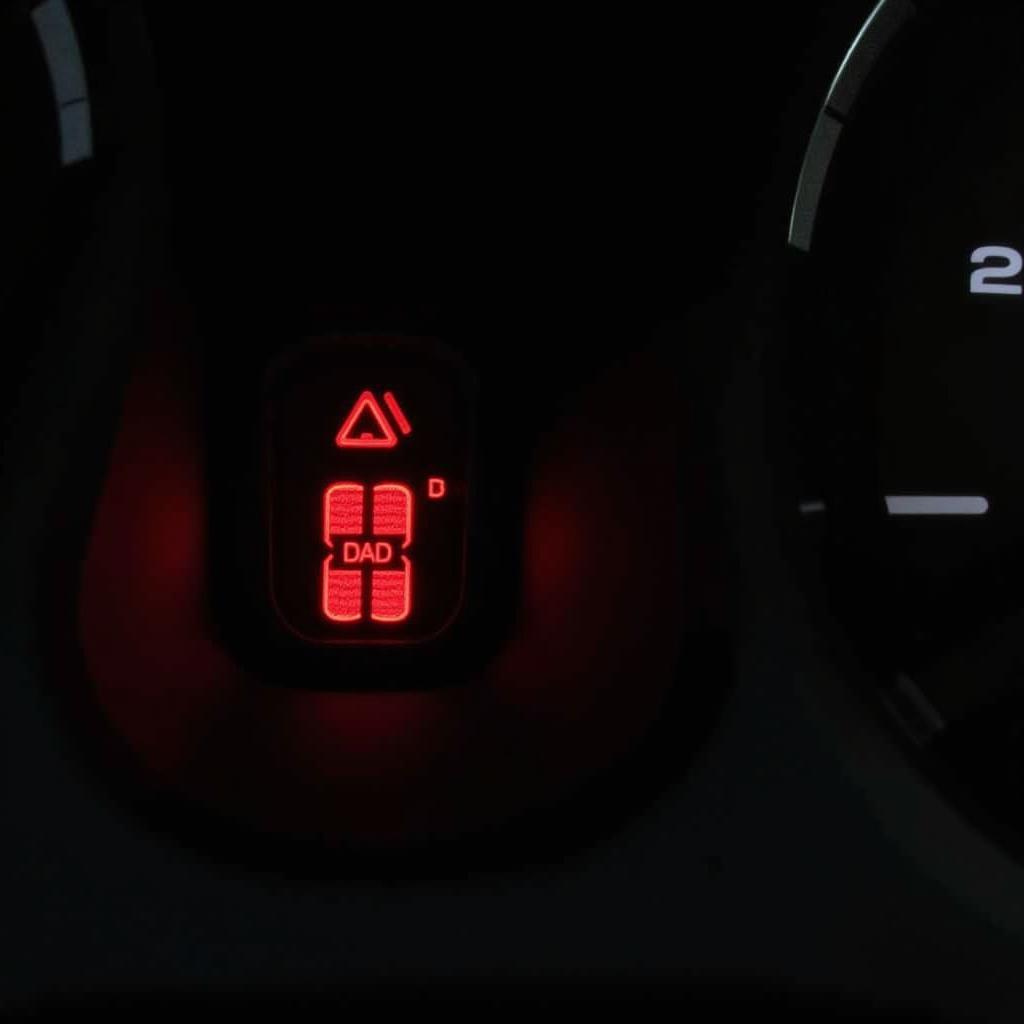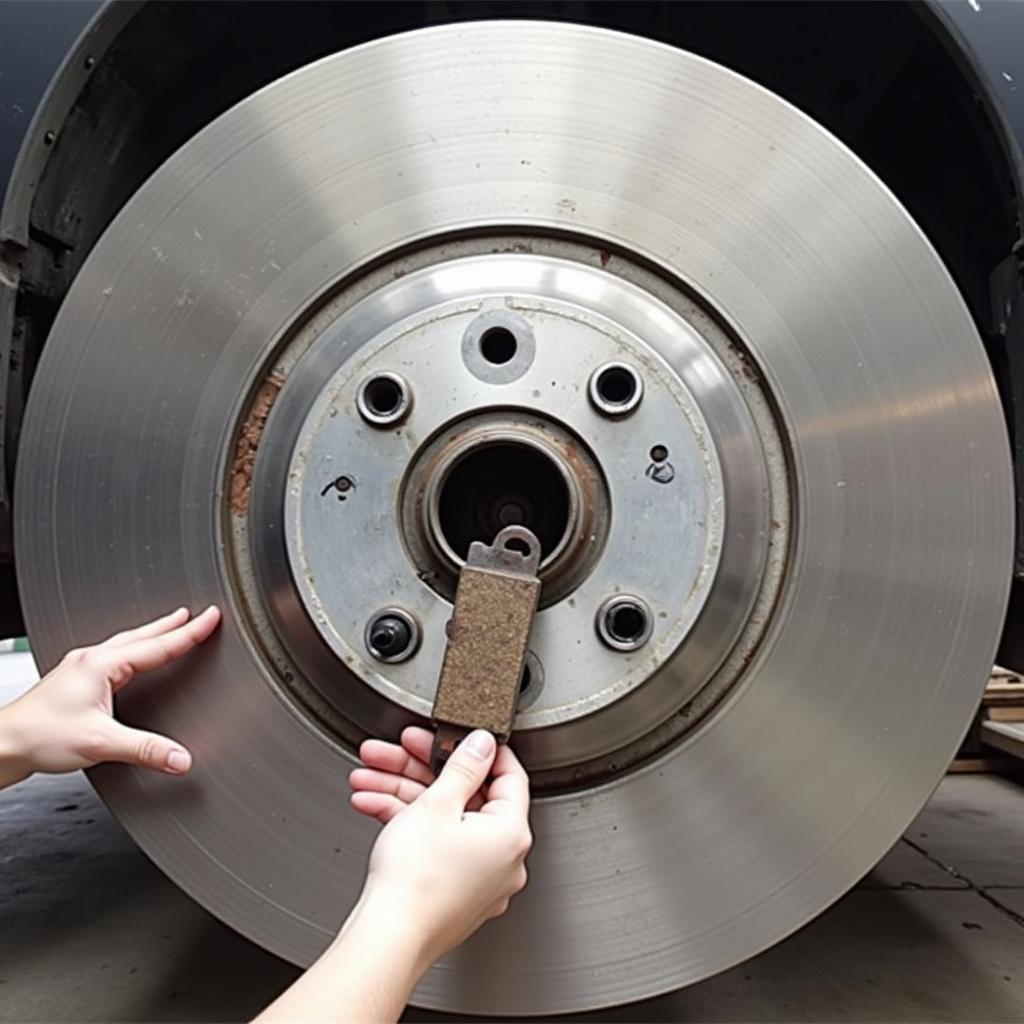The brake pad warning light on your VW Passat is an important safety feature. Ignoring it can lead to costly repairs and compromise your safety. This guide covers everything you need to know about the brake pad warning light in your VW Passat, from understanding why it illuminates to troubleshooting and fixing the issue.
If you see the brake pad warning light illuminated on your VW Passat’s dashboard, it’s essential to address it promptly. This light typically indicates that your brake pads are worn down and need to be replaced. Continuing to drive with worn brake pads can damage your rotors and other brake components. Moreover, it significantly reduces your braking power, putting you and others at risk.
Understanding Your VW Passat’s Brake System
Your VW Passat’s braking system is a complex network of components working together to ensure safe and efficient stopping power. Key components include the brake pads, rotors, calipers, brake fluid, and sensors. The brake pads are responsible for creating friction against the rotors, slowing and stopping the vehicle. As you use your brakes, the brake pads gradually wear down. The brake pad warning light is designed to alert you when the pads reach a critical wear level. Understanding how these components interact helps diagnose and address brake issues effectively. For example, a problem with your Toyota’s brake override system can also trigger a warning light. See more details on toyota brake override system warning light.
Why is My Brake Pad Warning Light VW Passat On?
While worn brake pads are the most common reason for the warning light, other factors can trigger it. These include low brake fluid, a faulty brake pad wear sensor, or issues with the ABS (Anti-lock Braking System). A malfunctioning sensor can send a false signal, illuminating the warning light even when the brake pads are in good condition. Similarly, low brake fluid can trigger the light, indicating a leak or other issues within the braking system. Identifying the root cause is crucial for effective repair.
 VW Passat Brake Pad Warning Light Illuminated
VW Passat Brake Pad Warning Light Illuminated
Troubleshooting the Brake Pad Warning Light VW Passat
Start by checking the brake pad thickness. If they appear thin or you can hear a grinding sound when braking, replacement is likely necessary. Inspect the brake fluid level; if it’s low, top it off and check for leaks. A persistent low fluid level signals a leak that needs immediate attention. You can also check the brake pad wear sensors for damage or disconnection. A 2008 Prius may have similar brake warning light issues. More information can be found at toyota prius 2008 brake warning light yellow.
How to Check Brake Pad Thickness
Visually inspect the brake pads through the wheel spokes. You should see a decent amount of pad material. If the pads look thin or you’re unsure, remove the wheel for a closer look. A good rule of thumb is that if the pad material is less than ¼ inch thick, it’s time for new pads.
 Inspecting VW Passat Brake Pads
Inspecting VW Passat Brake Pads
What if the Brake Light is Still On After Replacing the Pads?
If the brake pad warning light stays on after replacing the pads, there might be a problem with the sensor itself or a wiring issue. The sensor might need to be reset or replaced. It’s recommended to have a qualified technician diagnose the problem.
VW Passat Brake Pad Replacement: DIY or Professional?
While replacing brake pads is a relatively straightforward task for experienced DIYers, it requires specific tools and knowledge. Improper installation can compromise brake performance and safety. If you’re unsure about any step, it’s best to consult a professional mechanic. For insights into Toyota Camry brake system warning light issues, refer to toyota camry how to fix brake sysytem warning light.
“Regular brake maintenance is crucial for safety,” says Michael Schmidt, ASE Certified Master Technician. “Ignoring warning lights can lead to significant problems down the line.”
Remote Diagnostics and Software Solutions
In some cases, remote diagnostics and software solutions can help identify the cause of the brake pad warning light. These advanced tools allow technicians to access your vehicle’s computer system remotely, retrieve diagnostic codes, and potentially reprogram or update software related to the braking system. This can save time and money compared to traditional diagnostic methods. For information about a Toyota brake warning light issue, see brake system warning light toyota.
“Remote diagnostics can be a powerful tool for quickly pinpointing brake issues,” adds Schmidt. “It allows for faster and more efficient repairs.”
Conclusion
Addressing the brake pad warning light on your VW Passat promptly is vital for ensuring your safety and preventing costly repairs. By understanding the potential causes and following the troubleshooting steps outlined in this guide, you can take the necessary action to resolve the issue. Whether it’s a simple pad replacement or a more complex problem, prioritizing your brakes is essential for safe and reliable driving.
FAQ
- What does the VW Passat brake pad warning light look like? It typically looks like a circle with parentheses around it, or a symbol representing brake pads.
- How long can I drive with the brake pad warning light on? It’s not recommended to drive with the light on. Get it checked as soon as possible.
- Can I reset the brake pad warning light myself? While it’s possible in some cases, it’s best to have a professional diagnose and reset the light.
- How much does it cost to replace brake pads on a VW Passat? The cost varies depending on the model year and location, but it typically ranges from $150 to $300.
- How often should I check my brake pads? It’s a good idea to visually inspect your brake pads every 10,000 miles or during your regular tire rotations.
- Can worn brake pads damage my rotors? Yes, driving with worn brake pads can score or warp your rotors, leading to more expensive repairs.
- What happens if I ignore the brake pad warning light for too long? Ignoring the warning light can lead to brake failure, putting you and others at risk. A 2004 Toyota brake warning light issue provides a similar example; you can read more about it at 2004 toyota brake warning light won’t go off.
